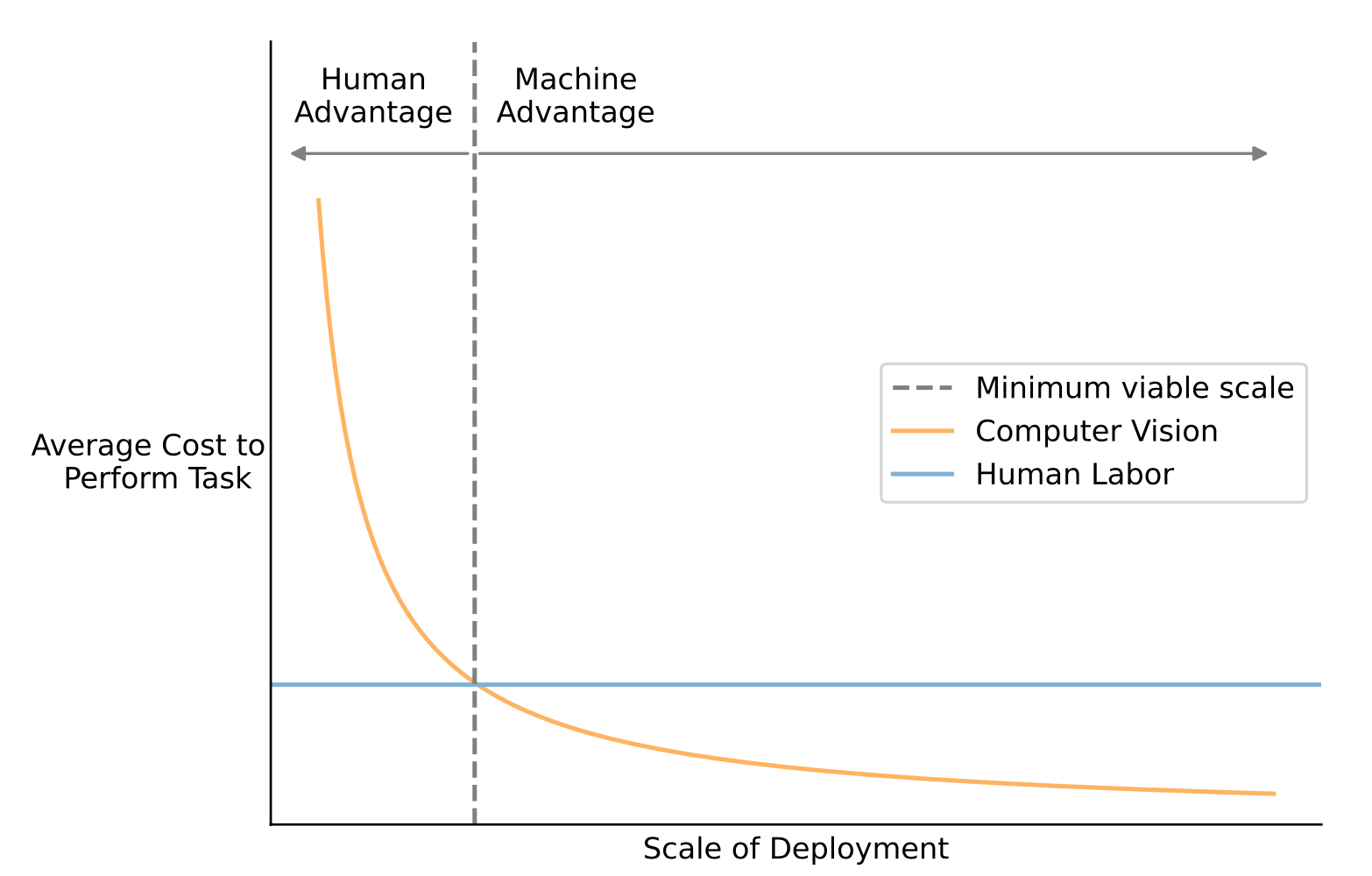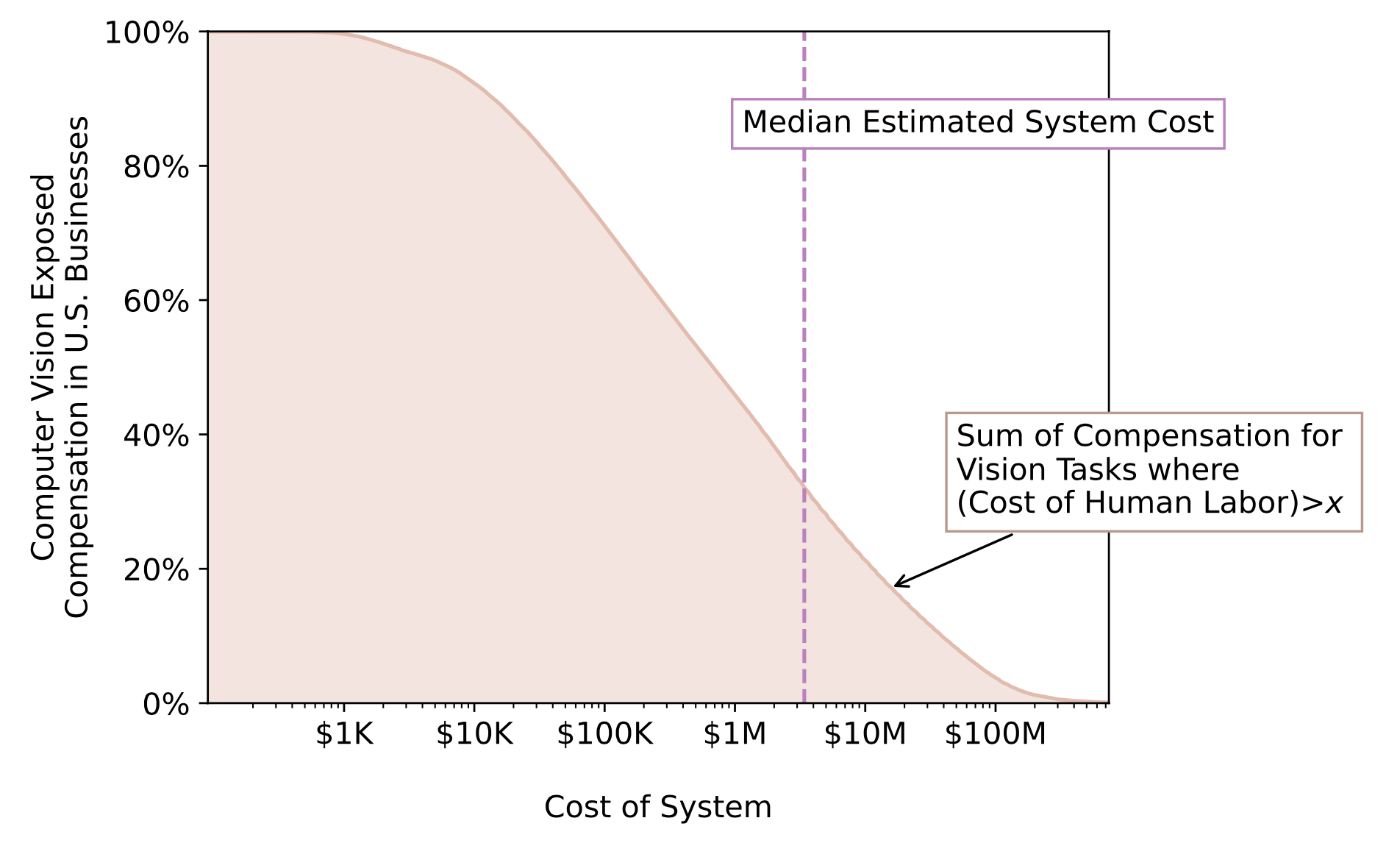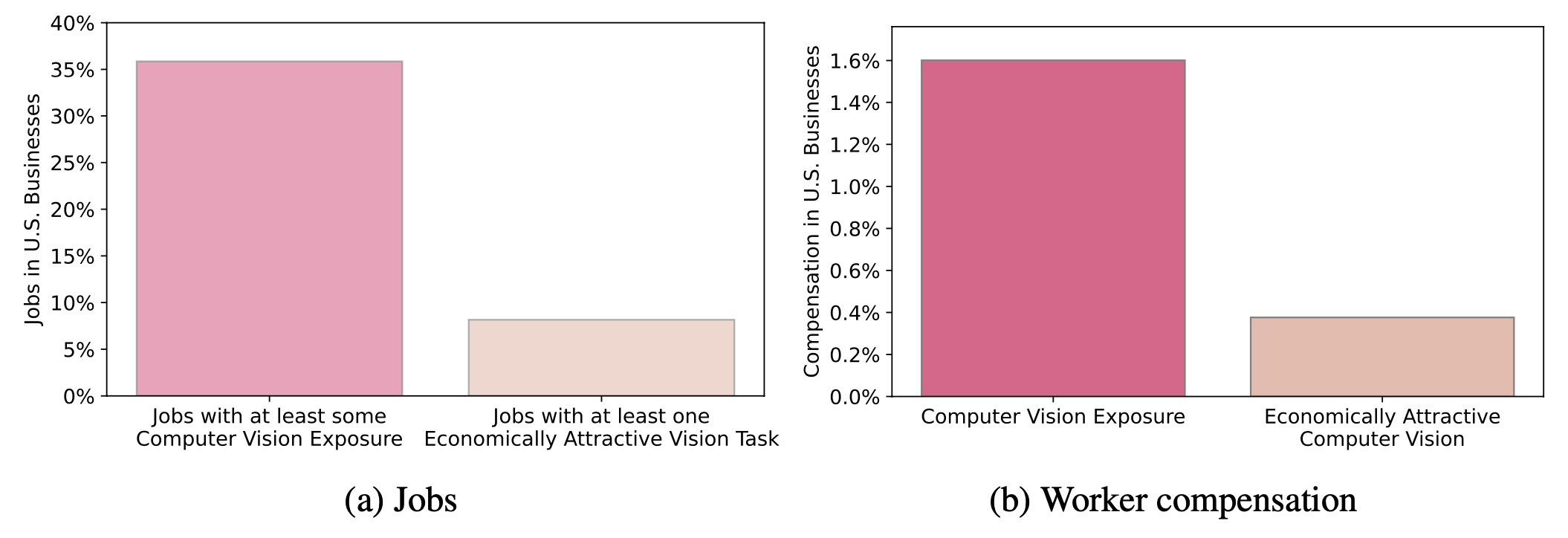The Economic Promise and Social Challenge of AI Automation
In an era of exponential technological growth, Artificial Intelligence (AI) emerges as a beacon of transformative potential. Among its diverse applications, computer vision—a facet of AI where machines interpret our visual reality—stands as a testament to human ingenuity and innovation. Yet, this new frontier also ushers in profound social and economic challenges, presenting a complex tapestry of opportunities and obstacles. Drawing upon the insightful "Beyond AI Exposure" report, this expanded exploration delves into the multifaceted relationship between AI automation and its broader implications on society, economy, and the very fabric of human work.
The Economic Tapestry Woven by AI
Transforming the Job Landscape
The minimum viable scale for AI deployment
The narrative surrounding AI and automation is often painted with broad strokes of optimism and fear. Optimism, for the potential economic growth and efficiencies it can introduce; and fear, for the shadow it casts on the future of work. A closer examination reveals a nuanced shift towards AI adoption, where only a selective 23% of tasks currently stand at the crossroads of economic viability for automation. This revelation speaks volumes about the gradual integration of AI into our work lives, challenging the doomsday prophesies of widespread job displacement. It's essential, however, to dive deeper into sector-specific forecasts, mapping out the terrain of industries that might bloom or wilt in AI's wake. By embedding detailed economic forecasts and analyses, we unlock insights into how AI could sculpt the job market of tomorrow, spotlighting areas of growth and those in need of reinvention.
AI Across Industries: A Spectrum of Impact
The transformative tale of AI unfolds uniquely across different sectors, simultaneously fueling innovation and prompting introspection on its far-reaching impacts. In manufacturing, AI stands as the backbone of efficiency, driving predictive maintenance systems that forecast machinery breakdowns before they occur, thus saving valuable time and resources. In contrast, the healthcare sector stands witness to AI's prowess in enhancing diagnostic accuracy, yet it is also in these corridors that the ethical dilemmas of AI come most starkly into the light. Questions of privacy, accountability, and the human touch in caregiving underscore the need for a balanced embrace of technology. These industry narratives not only serve to demonstrate AI’s potential but also to highlight the intricate dance of embracing innovation while navigating its societal implications.
Charting the Course: Policy, Ethics, and Human-centric Innovation
The Blueprint for an AI-Inclusive Future
Relationship between the cost of AI computer vision systems and the share of human vision task compensation that would be attractive for firms to automate.
As the AI wave advances, the crafting of inclusive policies and ethical guidelines becomes paramount. An exploration of pioneering policy initiatives across the globe reveals a tapestry of strategies aimed at harnessing AI's promise while cushioning its potential shocks. These initiatives underscore the importance of a policy framework that acts as both a compass and a cushion, steering technological advancement towards a future where benefits are widely distributed, and ethical considerations are at the forefront. Addressing AI biases, ensuring data privacy, and fostering an environment where technology upholds human dignity become the pillars upon which this future relies.
Unveiling AI: Beyond the Veil of Omnipotence
To navigate the AI landscape with clarity, it’s crucial to demystify its capabilities and acknowledge its limitations. Despite AI’s advanced pattern recognition and problem-solving prowess, its functionality is tightly tethered to the quality of its training data, reflecting inherent biases and sometimes lacking the nuanced judgment that human interaction provides. This discourse not only educates but also sets the stage for a more tempered and informed conversation about the role of AI—a tool that, while powerful, requires careful stewardship to realize its full potential positively.
Towards a Harmonious Coexistence
Illustrating the promise of AI in enhancing human capabilities, industries ranging from retail to entertainment showcase how AI-driven innovations can enrich customer experiences while empowering employees to engage in more complex, creative tasks. This paradigm of human-centric AI serves as a blueprint for integration, where technology amplifies human potential rather than superseding it.
Comparison of AI exposure and firm-level economic attractiveness for computer vision.
A Shared Journey into the AI Frontier
This expanded exploration encourages an interactive dialogue with our readers—your experiences, insights, and anticipations about AI's integration into your professional landscapes are invaluable. Through comprehensive resources and discussions, such as our upcoming webinar on AI adoption and workforce adaptation, we aim to navigate the complexities of AI together. This journey is one of shared discovery and collaboration, with a vision to foster an ecosystem where AI’s narrative is woven with threads of empowerment, innovation, and inclusivity, ensuring that technology’s march forward is in harmony with humanity’s collective aspirations and values.
In embarking on this journey, we not only understand AI's profound impact across economic sectors but also reiterate the importance of steering its development with thoughtful policies, ethical considerations, and a commitment to enhancing human work-life. The future painted by AI automation is rich with potential, provided we navigate its challenges with foresight and inclusivity.
Engage with Us: Share your thoughts and experiences with AI in the comments below.


